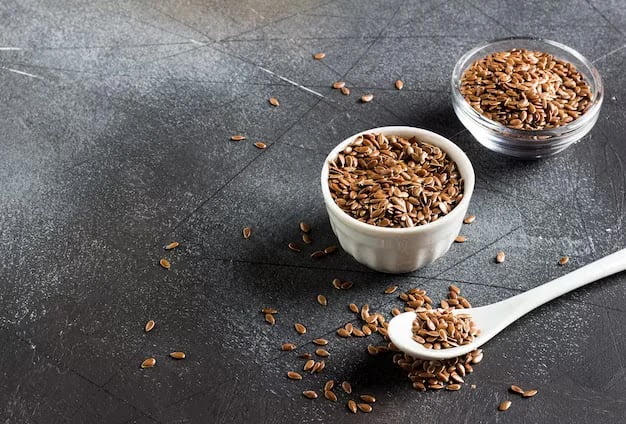Chia seeds have gained immense popularity in recent years due to their incredible health benefits. These tiny seeds pack a powerful nutritional punch and are especially known for their potential to aid in weight loss and promote heart health. In this article, we will explore the science behind chia seeds and uncover their many benefits.
What are Chia Seeds?
Chia seeds come from the Salvia hispanica plant, which is native to Central and South America. They have been consumed since ancient times and were a staple food for the Aztecs and Mayans. Chia seeds are small, flat, and oval-shaped, with a shiny appearance. They can be either black or white, but both varieties offer similar health benefits.
Nutritional Value of Chia Seeds
Despite their small size, chia seeds are packed with essential nutrients. They are rich in fiber, protein, healthy fats, and various vitamins and minerals. Just one ounce (28 grams) of chia seeds contains:
- Fiber: 11 grams
- Protein: 4 grams
- Healthy fats: 9 grams (including Omega-3 fatty acids)
- Calcium: 18% of the Daily Value (DV)
- Magnesium: 30% DV
- Phosphorus: 27% DV
- Manganese: 30% DV
Chia seeds are also a good source of antioxidants and contain trace amounts of other important nutrients such as zinc, potassium, and vitamin B3.
Chia Seeds for Weight Loss
Chia Seeds and Satiety
One of the key reasons chia seeds are often recommended for weight loss is their ability to promote feelings of fullness and reduce appetite. When immersed in liquid, chia seeds form a gel-like substance due to their high water absorption capacity. Consuming chia seeds can help increase satiety, which may lead to reduced food intake and contribute to weight management.
Chia Seeds and Metabolism
Chia seeds can also support weight loss by boosting metabolism. The high protein and fiber content helps increase the thermic effect of food, which means your body burns more calories during digestion. Additionally, chia seeds can help stabilize blood sugar levels, preventing spikes and crashes that can lead to cravings and overeating.
Incorporating Chia Seeds into Your Diet
Incorporating chia seeds into your diet is easy and versatile. You can sprinkle them over yogurt, oatmeal, or salads, or even add them to baked goods like muffins or bread. Chia seeds can also be used as an egg substitute in vegan baking. Consider soaking chia seeds in liquid to create a chia pudding, or blend them into smoothies for a nutrient-packed boost.
Chia Seeds for Heart Health
Omega-3 Fatty Acids in Chia Seeds
Chia seeds are an excellent plant-based source of omega-3 fatty acids, specifically alpha-linolenic acid (ALA). Omega-3 fatty acids are crucial for heart health, as they can help reduce inflammation, lower blood pressure, and improve overall cardiovascular function. Regular consumption of chia seeds may contribute to the prevention of heart disease.
Fiber in Chia Seeds
The fiber content in chia seeds also plays a significant role in supporting heart health. Fiber helps regulate cholesterol levels by reducing low-density lipoprotein (LDL) cholesterol, often referred to as “bad” cholesterol. By managing cholesterol levels, chia seeds can potentially lower the risk of heart disease and promote a healthy cardiovascular system.
Managing Cholesterol Levels
Chia seeds’ combination of healthy fats, fiber, and antioxidants helps maintain a healthy cholesterol profile. Incorporating chia seeds into a balanced diet, along with other heart-healthy habits, can be a wise choice for anyone concerned about their cardiovascular health.
Other Health Benefits of Chia Seeds
Blood Sugar Regulation
The soluble fiber in chia seeds slows down the absorption of sugar, preventing blood sugar spikes. This can be particularly beneficial for individuals with type 2 diabetes or those striving to maintain stable blood sugar levels. Chia seeds’ ability to regulate blood sugar may also prevent energy crashes and mood fluctuations caused by fluctuating glucose levels.
Digestive Health
The high fiber content of chia seeds promotes a healthy digestive system. Fiber adds bulk to the stool, preventing constipation and promoting regular bowel movements. Additionally, the gel-like consistency formed by chia seeds when soaked in liquid can act as a gentle laxative, alleviating digestive discomfort.
Antioxidant Properties
Chia seeds are packed with antioxidants, which help protect the body against harmful free radicals. Free radicals can damage cells and contribute to chronic diseases and premature aging. Including chia seeds in your diet can help enhance the body’s antioxidant defenses and promote overall health and longevity.
Bone Health
Chia seeds are a rich source of calcium, phosphorus, and magnesium, all of which are essential for healthy bones. Adequate intake of these minerals is associated with improved bone density and reduced risk of osteoporosis. Adding chia seeds to your diet can be a great way to support bone health, especially for individuals at risk of osteoporosis.
How to Use Chia Seeds in Your Diet
Chia Pudding
Chia pudding is a simple and delicious way to enjoy the benefits of chia seeds. To make chia pudding, mix chia seeds with your choice of liquid (such as almond milk or coconut milk) and let it sit in the refrigerator overnight. In the morning, you’ll have a creamy and nutritious pudding that can be enjoyed plain or topped with fruits, nuts, or seeds.
Chia Smoothies
Another popular option is adding chia seeds to smoothies. Blend your favorite fruits, leafy greens, and a spoonful of chia seeds for a nutrient-packed and filling smoothie. The chia seeds will add a pleasant texture and boost the nutritional value of your beverage.
Chia Egg Substitute
If you’re looking for an egg substitute in baking, chia seeds are an excellent option. Mix one tablespoon of chia seeds with three tablespoons of water and let it sit for a few minutes. The mixture will thicken and can be used as an egg replacement in recipes.
Safety and Precautions
While chia seeds offer numerous health benefits, it’s essential to consume them in moderation. Their high fiber content might cause digestive discomfort if eaten in excessive amounts. Additionally, if you have any existing medical conditions or are taking medications, it’s always best to consult with your healthcare provider before making significant dietary changes.
Conclusion
Chia seeds are truly a superfood when it comes to weight loss and heart health. With their rich nutritional profile, ability to increase satiety, support a healthy metabolism, and promote heart health, they are a valuable addition to any diet. From their omega-3 fatty acids to their fiber content, chia seeds offer a range of benefits that can positively impact overall well-being.
FAQs
1. Are chia seeds safe for consumption during pregnancy?
Pregnant women can safely consume chia seeds in moderation as part of a balanced diet. However, it’s always recommended to consult with a healthcare professional before making any dietary changes during pregnancy.
2. Can chia seeds cause allergies?
Chia seeds are considered to be a low-allergenic food. However, individuals with seed allergies should exercise caution and consult with an allergist before consuming chia seeds.
3. Can I consume chia seeds if I have a history of digestive issues?
While chia seeds can be beneficial for promoting digestive health, their high fiber content may cause digestive discomfort in some individuals. If you have a history of digestive issues, start by consuming small amounts of chia seeds and gradually increase as tolerated.
4. Can I replace chia seeds with flaxseeds?
Both chia seeds and flaxseeds offer similar health benefits. If you’re unable to consume chia seeds, flaxseeds can be a good alternative. Just keep in mind that the nutritional profile and culinary uses of the two seeds differ slightly.
5. Where can I buy chia seeds?
Chia seeds are widely available in grocery stores, health food stores, and online retailers. Look for organic, high-quality options to ensure the best nutritional value.






